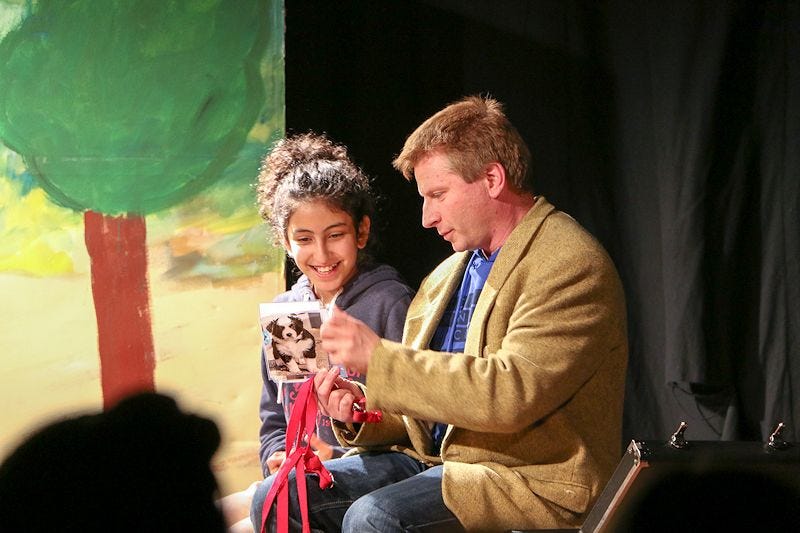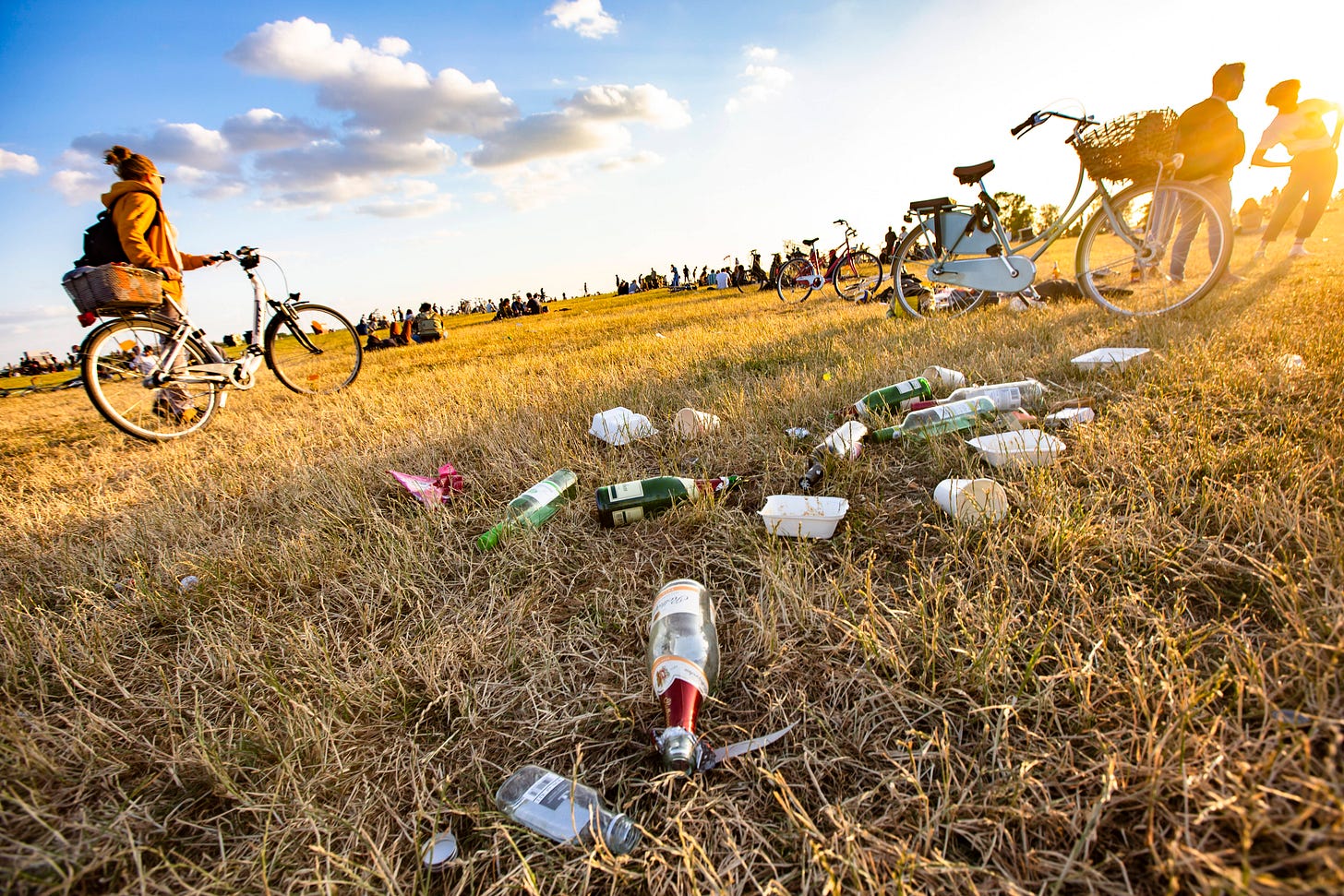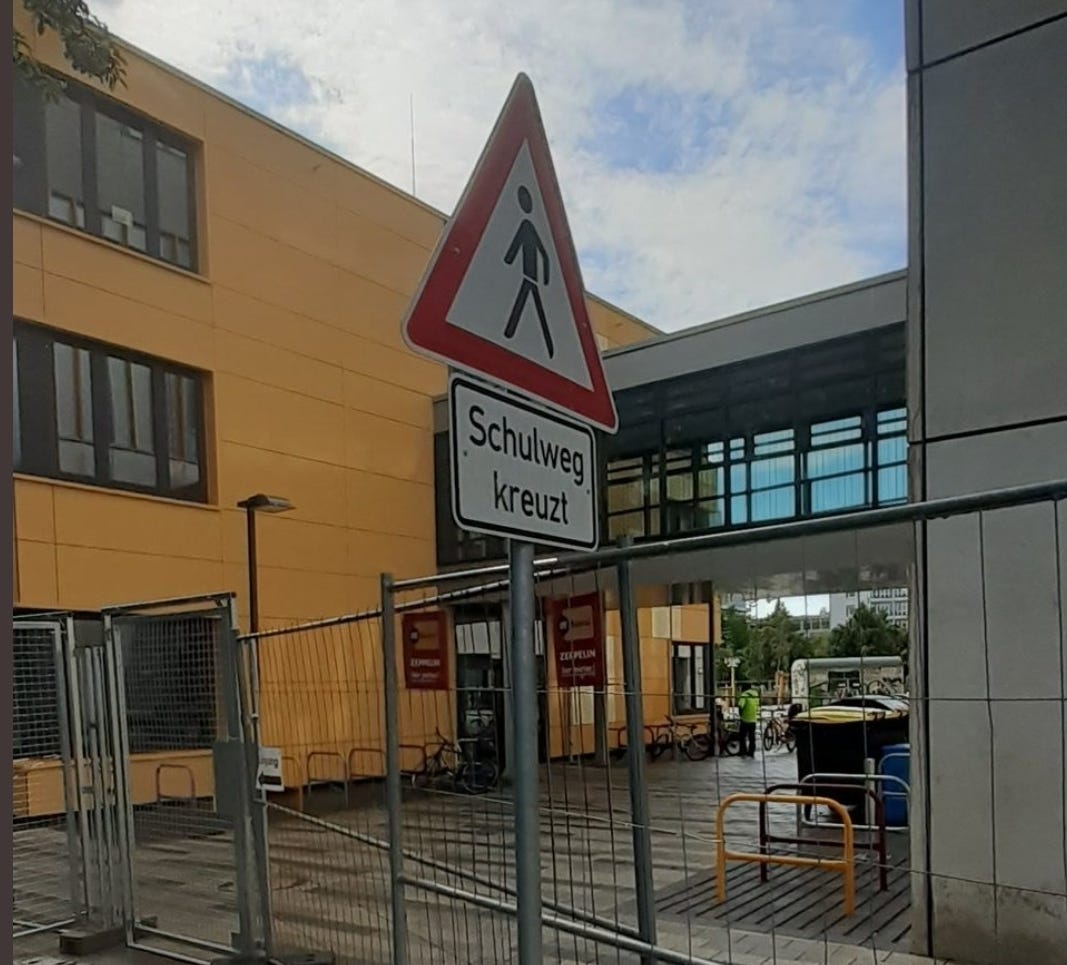#79: New Germans, how safe are schools?, cats, trashed parks
And a new campaign to achieve climate neutrality by 2030.
Dear 20 Percent,
Call me a Spießer for complaining about trashed parks, but what is it about Berliners that they just can’t be bothered to dump their garbage in a garbage can or if those are overflowing, just bring it home? Pack it in, pack it out, to quote Woodsey the Owl — even if it’s just Hasenheide and not the Pacific Crest Trail.
I just read that Friedrichshain-Kreuzberg alone spent €666,300 for park clean-up last year, up from €619,000 in 2020. Officials say it will be more expensive this year. And you know the poor trash pickers will barely be able to keep up with the deluge.
Generally speaking, I love Berlin’s who-gives-a-shit attitude. Nobody cares what you wear. Nobody cares how much money you make. But I draw the line when people treat the city’s precious green spaces like a landfill or open sewer.
Of course, the state is partly to blame. It can’t provide enough bins and the ones they do have are much too small or don’t actually work (aka trashcan diarrhoea) — crazy for a country that has no problem building a Porsche.
More news below! Plus, are international schools doing enough to keep our kids safe?A Longish Read on an issue raised by one of our readers.
Maurice
P.S. If you like 20 Percent Berlin, please consider supporting us on Patreon.
The Berlin corona stats for Friday, June 3
Received booster: 61.2% (61.1% Tuesday)
New cases in one day: 1,060 (1,900 Tuesday)
Total deaths: 4,617 (+5 over Tuesday)
🔴 7-day Covid-19 incidence (cases per 100,000): 217.6 (189.2 Tuesday)
🟡 7-day hospitalization incidence (also per 100,000): 4.7 (4.5 Tuesday)
🟢Covid-19 ICU patient occupancy: 3.2% (3.6% Tuesday)
Source: Berlin’s corona page
More new German citizens
The Berlin-Brandenburg statistics office reported an uptick in naturalisations in Berlin last year. A total of 7,820 Berliners took on German citizenship in 2021, 22 percent more than 2020. The top nationalities of those opting for German passports were Turkish (10 percent), Syrian (8 percent) and Polish (6 percent).
Climate referendum?
I don’t know about you, but I’m impressed by the energy and dedication of Berliners unhappy with the status quo who increasingly reach for the referendum as a political tool to pressure the city government on specific issues. The latest campaign is Klima Neustart Berlin (Restarting the Climate, no English info). The backers believe the Senat isn’t doing enough to bring us in line with the 1.5°C goals of the Paris Agreement and want a binding commitment to climate neutrality by 2030. City environment and climate head Bettina Jarasch (Grüne) and the state parliament’s environment committee say 2030 is unreaslistic, because there simply aren’t enough qualified workers to carry out the work to make the city’s buildings climate neutral. But that isn’t stopping Klima Neustart from getting on with the first stage of collecting at least 175,000 signatures.
House arrest for cats

Berlin wants to reduce the number of stray cats (currently 10,000, according to the environment department) roaming the streets. Broadcaster RBB reports that the new Katzenschutzverordnung (cat protection law) goes into effect on June 9. From that day, only sterilised, chipped and registered cats are permitted to roam free within the city limits. But you can take your non-sterilised, non-chipped, non-registered cat on a walk if you keep it on a leash. Cats that break the new rule will be sterilised and their owners will have to pick up the bill. And probably also get a stern talking-to.
Monday’s a holiday
Monday is Pfingstmontag (Pentecost) and a bank holiday, meaning most supermarkets will be shut. They’ll also be closed Sunday, obviously, meaning Germans will be raiding shelves Saturday morning. Of course, stores at the larger train stations (e.g. Hauptbahnhof, Ostbahnhof, Friedrichstrasse, Gesundbrunnen) will remain open, but expect Black Friday numbers. Pro tip: stock up for the next four days today. We’ve got your back with a list of what’s open if you forgot something for that Monday picnic or if you run out of toothpaste.
Factoid
At 8.6 percent, inflation in Berlin in May reached the highest level since 1992, slightly higher than the national rate of 7.9 percent. Rising fuel prices have affected the cost of everything. Germany is attempting to provide relief with the €9 transport ticket and a temporary petrol tax cut. Chancellor Olaf Scholz (SPD) says he’s considering more measures to alleviate the financial pain.
Longish Read: Schoolyard safety fears
Last week, a reader wrote to us about a disturbing incident at their kid’s elementary school in Wedding: On May 20 a child at the Grundschule Nordhafen reported being “held and threatened” by an unknown person who had entered the schoolyard. The child, reportedly a girl, was unharmed by the intruder, allegedly a woman who had walked through an unlocked school gate (photo below). The police were called and advised the school, which said it was implementing new safety measures: more staff during playground breaks; children were told not to play in the area near the gate (a “blind spot” according to the parent I spoke to); kids were told how to react if they encountered strangers; the gate in question would remain closed (but not locked) — the area is a fire assembly point, the parent told me, making it impossible to lock but the parent feels that the school’s reaction to the “attempted kidnapping” is inadequate.
May 24 was the day of the horrific shooting in a Texas school, bringing the issue of school security to the forefront of parents’ minds. Though nothing comparable has happened in Berlin, incidents such as the one at Grundschule Nordhafen raise the question: how safe are Berlin schools?
When I asked for comment on the incident, the school’s principle Gabriele Woithe referred me to the Berlin education department (Senatsverwaltung für Bildung, Jugend und Familie), which has yet to get back to me after a week. I reached out to several international schools to enquire about their security policies, but none responded. The Berlin police, refreshingly, answered my query.
What can be done?
Polizeioberkommissar Martin Halweg wrote that the incident was being investigated as a case of Verdachts der Freiheitsberaubung (suspected deprivation of liberty). I asked how many child kidnappings took place in Berlin, and he answered “zero” in 2021 and 2020.
What can schools do to prevent this sort of incident? Halweg: “It is primarily the responsibility of the school or the Senatsverwaltung für Bildung, Jugend und Familie to ensure that the children in the care of the school are protected from third parties (e.g. by locking entrance areas or by organising appropriate schoolyard supervision staff).” Schools are required to have a security concept — and receive advice from police, when, for example, new facilities are built.
Despite the incident at Grundschule Nordhafen, police stats suggest that such events, or worse, are rare. But isolated brutal crimes have occurred, for example, when a 30-year-old man sexually abused an 8-year-old girl in a toilet at a Wedding elementary school in 2012. The police say they offer schools sexual abuse prevention programmes, which include a theatre project.

When it comes to our children, schools can never be safe enough, and for some international parents, Berlin does seem lax. Following the 2012 assault, there was widespread debate about installing CCTV at schools, but that appears to have since fizzled out in Berlin. Rules on video surveillance differ according to Bundesland. Hamburg has, for example, installed hundreds of cameras at schools.
Parents who have fears about the safety of their kids schools shouldn’t shy from bringing them up with school authorities. Ruby Mattig-Krone is Berlin’s “quality manager”, a kind of ombudswoman who deals with complaints of all kinds.
If you have a story you’d like to share please get in touch: newsroom@20percent.berlin




I don't understand why the safety of "international schools" are being singled out here when both of the incidents mentioned in the story occured at state schools. School safety is certainly a concern for everyone, but why single out one set of schools for criticism when there is no evidence they have been found lacking in this regard?
More newsletters from Frank, less from Maurice. "trashcan diarrhoea" is so cringe.